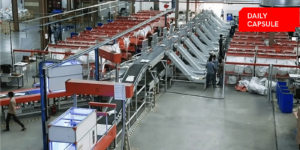
The Indian aerospace industry has undoubtedly come a long way since its incorporation. With humble beginnings, the private sector has generated over 20 per cent of the Rs 80,000 crore turnover, opening unimaginable growth avenues for the Indian aerospace and defence sector.
Backed by a robust foundation in space research and a surging presence in the commercial aviation industry, the future of the aerospace industry holds immense potential with the accelerated efforts of both the government and private players.
India’s remarkable progress in space exploration and its myriad accolades have allowed it to emerge as a role model for the global space community. The resounding success of Chandrayaan and Mangalyaan missions has paved the way for growth and advancements in deep space exploration, whilst fostering a spirit of innovation. At the same time, the commercial aviation segment has witnessed a sudden boom, propelled by increased disposable income and rising demand for air travel.
Manifesting to make India a self-reliant nation, especially in the domain of aerospace, the government’s ‘Make In India’ campaign has paved the way for a seismic transition in the aerospace landscape. The sector, which was previously an asset available only in the hands of government institutions like ISRO, DRDO, and HAL, has now opened its gateway for private sector participation, capitalising on domestic manufacturing, research, and development.
Beyond government involvement
While India’s aerospace industry has been on an upward trajectory backed by the government’s relentless support and investments in the sector, beyond that, the industry has created space for private members to further accelerate and contribute to its growth.
With the emergence of more than 350 private space companies, the sector has made rapid strides in making India a globally preferred destination for aero structures, components, and complex systems assemblies. Private OEMs establishing hubs in India has accelerated the endemic manufacturing of aerospace parts and assemblies, which fit into commercial, defence aircrafts. Thus, private companies are actively working on innovative space technologies that deliver end-to-end aerospace solutions.
Transformation in academia, R&D
Progression in the aerospace sector is dependent on attaining a delicate equilibrium between private and public players. This balance can be instrumental in creating a robust aerospace ecosystem wherein research initiatives are undertaken through investments made in the research and development (R&D) department.
Aerospace research has touched the space of propulsion systems, aerodynamics, advanced materials, and space exploration with the help of private research centres and laboratories devoted to aerospace R&D.
Further, private educational institutions are adapting to the changing trends of the aerospace industry by covering aspects of both theoretical and practical knowledge by delivering training workshops to bridge the gap between academics and industrial application.
Accelerated partnership between ISRO and private players has created a plethora of job opportunities for budding aerospace enthusiasts. A market analysis by Xpheno projects the aerospace job market in India to grow 30% year on year.
Driven by commitment to innovation and technological progress, private presence in the research and education realm has significantly transformed the skills scenario by nurturing a workforce that is skilled par excellence.
Technological wave
Innovation is the backbone that can turn mere ideas into reality, especially with technological advancements occurring at an unprecedented rate. Breaking established practices, private players have ushered in a new era of innovation by leveraging cutting-edge technology that has propelled the development of aeronautical equipment and system manufacturing.
The concept of using artificial intelligence, machine learning, and advanced robotics is driving the progression of expedited advanced chip manufacturing and has significantly repositioned the design and software of traditional models. With cost cutting, supply chain reorganisation, and expedited delivery, the integration of Industry 4.0 technologies in the aerospace sector has become the latest trend.
A world of endless possibilities
Soaring to great heights, the aerospace sector has left no corner unturned with constant developments made in every field–from R&D and indigenous manufacturing to innovation in technology and focus on sustainability.
With government support and robust partnerships between private and public players, the industry is ready to foster a skilled workforce capable of elevating India to a level where it stands as a global aerospace powerhouse. Thus, the role of private companies has just opened the door to an exciting journey that extends beyond set horizons.
The author is Co-founder and Mentor of Logic Fruit Technologies, which is into product engineering and design services.
Edited by Swetha Kannan
(Disclaimer: The views and opinions expressed in this article are those of the author and do not necessarily reflect the views of YourStory.)






![Read more about the article [Funding alert] OfBusiness valuation jumps to $5B, to acquire 20 companies by early 2022](https://blog.digitalsevaa.com/wp-content/uploads/2021/12/Imagewn7m-1627741969912-300x150.jpg)



